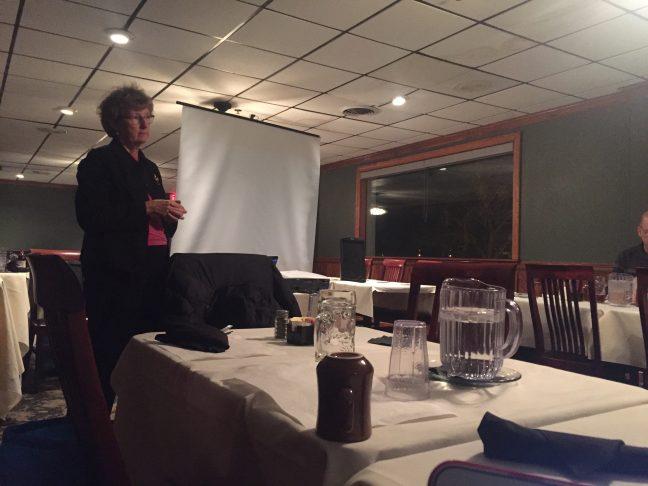In an event Tuesday, an advocate for nuclear non-proliferation led a forum on the recent release of President Donald Trump’s budget report, focusing on his choice to raise defense spending.
In an event hosted by Reach Out Wisconsin, a bipartisan group which invites speakers to lead political forums and discussions for the Madison community, Paula A. Rogge spoke on the ramifications of Trump’s budget — one of which is the possibility of increased spending on nuclear warfare.
Rogge is a medical doctor and organizer for Wisconsin Physicians for Social Responsibility, a group of healthcare professionals who advocate for nuclear weapon non-proliferation and the prevention of climate change. She has been outspoken in the past about her opinions on military spending.
A self-proclaimed pacifist and Quaker, a sect within the Christian faith, Rogge has believed since her time in medical school that nuclear weapons are the biggest threat to public health today.
In a 2017-18 blueprint, the amount going toward military spending will jump from 54 percent to 59 percent. But according to a Quaker lobbying group called Friends Committee on National Legislation, healthcare, clean energy and education will face budget cuts despite the fact they all create more jobs than military spending.
As her background is in nuclear weaponry, Rogge’s presentation focused on discouraging this rise in defense spending based on how much of it could potentially be allocated toward nuclear weaponry. Nuclear weapons are the one armament system in the U.S. that decrease world security, Rogge argued.
Rogge went on to mention several instances involving close calls with nuclear war which she maintained were almost always preventable. While she realizes accidents happen, she believes this kind of accident can be avoided.
Rogge used the 1945 bombing of Hiroshima as an example of the medical hazards relatively minimal nuclear weapons could cause, considering modern warheads can have anywhere from 7 to 35 times as much power as the weapon which bombed Hiroshima.
The only use of nuclear weapons is to harm millions of people, which military professionals of today see as having no practical purpose, Rogge said.
“We have the equivalent of 60,000 Hiroshima-sized bombs that could be fired at any minute,” Rogge said.
Rogge compared the effects of the Hiroshima bomb to how a similarly sized bomb might affect Madison today. If dropped in downtown Madison, 25 percent of the population would die immediately and there would be 78 percent fatalities in the aftermath.
Nuclear bombs not only harm people, Rogge said, but damage any medical facility within the area that might be able to help those affected. With only 1,800 burn center beds nationwide, she said the nation simply wouldn’t be able to cope with a tragedy of that magnitude.
“There’s no way we would be able to respond to a full-on attack,” Rogge said.
She also spoke on the long-term effects of nuclear war. If five million tons of nuclear snow — the result of the disposal of every nuclear warhead in existence — was released into the atmosphere, it would lead to decreased temperatures, rainfall and growing seasons.
The best way to avoid a problem like this is to encourage nonviolent ways to protect ourselves, Rogge said. As an activist opposed to violence, she supports cybersecurity and putting money into disarming nuclear weapons rather than building more.
“Disarm without harming people,” Rogge summed up.


